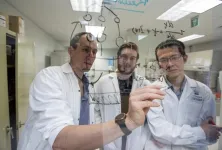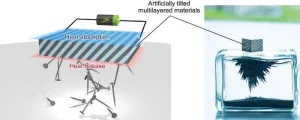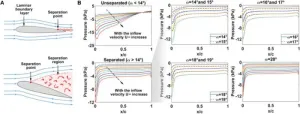(Press-News.org) WASHINGTON - A mouse study designed to shed light on memory loss in people who experience repeated head impacts, such as athletes, suggests the condition could potentially be reversed. The research in mice finds that amnesia and poor memory following head injury is due to inadequate reactivation of neurons involved in forming memories.
The study, conducted by researchers at Georgetown University Medical Center in collaboration with Trinity College Dublin, Ireland, is reported January 16, 2024, in the Journal of Neuroscience.
Importantly for diagnostic and treatment purposes, the researchers found that the memory loss attributed to head injury was not a permanent pathological event driven by a neurodegenerative disease. Indeed, the researchers could reverse the amnesia to allow the mice to recall the lost memory, potentially allowing cognitive impairment caused by head impact to be clinically reversed.
The Georgetown investigators had previously found that the brain adapts to repeated head impacts by changing the way the synapses in the brain operate. This can cause trouble in forming new memories and remembering existing memories. In their new study, investigators were able to trigger mice to remember memories that had been forgotten due to head impacts.
“Our research gives us hope that we can design treatments to return the head-impact brain to its normal condition and recover cognitive function in humans that have poor memory caused by repeated head impacts,” says the study’s senior investigator, Mark Burns, PhD, a professor and Vice-Chair in Georgetown’s Department of Neuroscience and director of the Laboratory for Brain Injury and Dementia.
In the new study, the scientists gave two groups of mice a new memory by training them in a test they had never seen before. One group was exposed to a high frequency of mild head impacts for one week (similar to contact sport exposure in people) and one group were controls that didn’t receive the impacts. The impacted mice were unable to recall the new memory a week later.
“Most research in this area has been in human brains with chronic traumatic encephalopathy (CTE), which is a degenerative brain disease found in people with a history of repetitive head impact,” said Burns. “By contrast, our goal was to understand how the brain changes in response to the low-level head impacts that many young football players regularly experience.”
Researchers have found that, on average, college football players receive 21 head impacts per week with defensive ends receiving 41 head impacts per week. The number of head impacts to mice in this study were designed to mimic a week of exposure for a college football player, and each single head impact by itself was extraordinarily mild.
Using genetically modified mice allowed the researchers to see the neurons involved in learning new memories, and they found that these memory neurons (the "memory engram") were equally present in both the control mice and the experimental mice.
To understand the physiology underlying these memory changes, the study’s first author, Daniel P. Chapman, Ph.D., said, “We are good at associating memories with places, and that's because being in a place, or seeing a photo of a place, causes a reactivation of our memory engrams. This is why we examined the engram neurons to look for the specific signature of an activated neuron. When the mice see the room where they first learned the memory, the control mice are able to activate their memory engram, but the head impact mice were not. This is what was causing the amnesia.”
The researchers were able to reverse the amnesia to allow the mice to remember the lost memory using lasers to activate the engram cells. “We used an invasive technique to reverse memory loss in our mice, and unfortunately this is not translatable to humans,” Burns adds. “We are currently studying a number of non-invasive techniques to try to communicate to the brain that it is no longer in danger, and to open a window of plasticity that can reset the brain to its former state.”
###
In addition to Burns and Chapman the authors include Stefano Vicini at Georgetown University and Sarah D. Power and Tomás J. Ryan at Trinity College Dublin, Ireland.
This work was supported by the Mouse Behavior Core in the Georgetown University Neuroscience Department and by the National Institutes of Health (NIH) / National Institute of Neurological Disorders and Stroke (NINDS) grants R01NS107370 & R01NS121316. NINDS also supported F30 NS122281 and the Neural Injury and Plasticity Training Grant housed in the Center for Neural Injury and Recovery at Georgetown University (T32NS041218). Seed funding is from the CTE Research Fund at Georgetown.
The authors report having no personal financial interests related to the study.
END
New research led by the University of Oxford indicates that human domestication of crops can alter the communities of microorganisms that are associated with plants. Intriguingly, independent domestication events were found to have similar impacts on the plant microbiome. The results have been published today in Current Biology.
Lead researcher Dr Riccardo Soldan (Department of Biology, University of Oxford) said: 'Our study provides evidence that regardless of where and how domestication took place, domesticated ...
“Identification and validation of novel and targetable metabolic weaknesses in AML is ongoing.”
BUFFALO, NY- January 16, 2024 – A new editorial paper was published in Oncotarget's Volume 14 on December 1, 2023, entitled, “Reductive carboxylation of glutamine as a potential target in acute myeloid leukemia.”
In this new editorial, researchers Alessia Roma, Lawrence D. Goodridge and Paul A. Spagnuolo from the University of Guelph discuss acute myeloid leukemia (AML) — an aggressive cancer of the blood and bone marrow ...
ITHACA, N.Y. – Openly gay, bisexual and other sexual minority men were more likely than those who conceal their sexual orientation to seek care for mpox during a global outbreak of the disease last year that disproportionately affected their community, researchers from Cornell University and the University of Toronto found.
It wasn’t necessarily concern over being “outed” that kept some sexual minority men from seeking care for the disease, formerly known as monkeypox. According to the researchers, it was an information gap, partially attributable to separation from community due to identity concealment.
“The resource knowledge and community-connected ...
2023 has just been confirmed as the hottest year on record, with global average temperatures exceeding pre-industrial conditions by 1.48°C, as stated by the Copernicus Programme of the European Union. Climate scientists from the Barcelona Supercomputing Center-Centro Nacional de Computación (BSC-CNS), based on the BSC decadal forecast system, were capable of predicting a year ago that 2023 had a high probability of being the warmest year on record.
After the record-smashing conditions in 2023, the imminent question is how the year 2024 and the following years will ...
The inner workings of the human brain are a gradually unraveling mystery and Dr. Richard Naud of the University of Ottawa’s Faculty of Medicine has led a highly compelling new study that brings us closer to answering these big questions. The study’s results have important implications for theories of learning and working memory and could potentially help lead to future developments in artificial intelligence (AI) since AI developers and programmers watch the work of Dr. Naud and other leading neuroscientists.
Published in Nature Computational Science, the study tackles the many-layered mystery ...
Sai Manoj Pudukotai Dinakarrao, Assistant Professor, Electrical and Computer Engineering, received funding for the project: "Cyber Sentinel: Safeguarding Autonomous Vehicle Supply Chains against Backdoors in Hardware."
Pudukotai Dinakarrao is working with University of Virginia researchers who aim to deploy a backdoor attack mitigation and avoidance approach for vehicles.
Haiying Shen, Associate Professor, Computer Science; Associate Professor, Electrical and ...
1. A NIMS research team has demonstrated that the transverse thermoelectric conversion (i.e., energy conversion between charge and heat currents that flow orthogonally to each other) can be greatly enhanced by applying magnetic fields or utilizing magnetism. In addition, the team developed a thermoelectric permanent magnet—a new functional material capable of thermoelectric cooling and power generation—by combining permanent magnets and thermoelectric materials into a hybrid structure. These results may guide in achieving thermal ...
To prevent aircraft stalls, engineers have long studied the flow of air over airfoils such as airplane wings to detect the angles when flow separation occurs. Recently, a team of researchers at Shanghai Jiao Tong University including Xi-Jun Yuan and Zi-Qiao Chen investigated the use of quantum computing in connection with machine learning as a more accurate way of solving such problems. Their research was published Nov. 21 in Intelligent Computing, a Science Partner Journal.
The use of a quantum support vector machine rather than a classical support vector machine increased the accuracy of classification of flow separation from 81.8% ...
The scientific community has long been enamored of the potential for soft bioelectronic devices, but has faced hurdles in identifying materials that are biocompatible and have all of the necessary characteristics to operate effectively. Researchers have now taken a step in the right direction, modifying an existing biocompatible material so that it conducts electricity efficiently in wet environments and can send and receive ionic signals from biological media.
“We’re talking about ...
Key takeaways
Decreasing trend in opioid prescriptions: There was a notable nationwide reduction in opioid prescriptions after surgery from 2013 to 2017, reflecting a shift in the medical community's approach to pain management.
Social determinants affect opioid prescription rates: At the county level, lower median population age, higher education levels, insufficient sleep, higher health care costs, fewer mental health providers, and higher uninsured rates are linked to higher opioid prescription rates.
No ...




